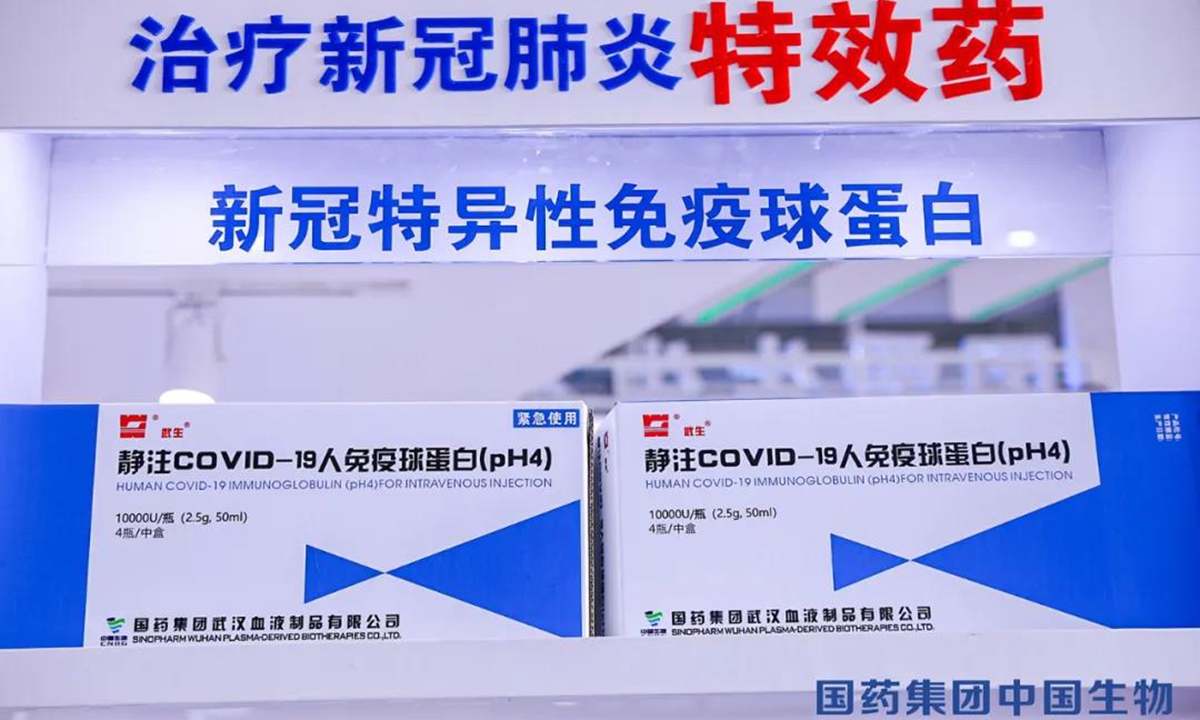World's first COVID-19 drug based on recovered patients' plasma to enter clinical trials, effective against severe cases: pharma company

Photo: CNBG
The world's first COVID-19 drug based on human immunoglobulin developed from plasma from recovered COVID-19 patients will enter clinical trials, vice president of China National Biotec Group (CNBG), a Sinopharm subsidiary has said.
Convalescent plasma has previously been included in the national COVID-19 treatment plan, and has shown very good efficacy for critically ill and severe COVID-19 patients, Zhu Jingjin, also senior clinical trials leader of CNBG, said in a release published on Sunday by the official WeChat account of State-owned Assets Supervision and Administration Commission of the State Council (SASAC).
The producer's latest second-generation COVID-19 vaccines designed especially for common variants such as Delta and Beta have also shown good initial results, the firm said.
More than 2.1 billion doses of COVID-19 vaccines had been administered nationwide as of Saturday, according to national health authorities on Sunday. China's main vaccine producer Sinopharm on Sunday revealed that it has submitted an official plan for a booster shot for approval.
The new drug, developed from plasma of recovered COVID-19 patients or of vaccinated uninfected people, contains high-potency SARS-COV-2 neutralizing antibodies. It has completed preclinical studies and animal tests, which have shown significant relief of symptoms and damage caused by novel coronavirus infection, and will enter phase III soon, the Global Times learnt from CNBG.
In the absence of new drug resistance to the novel coronavirus that is sweeping the globe, CNBG, learning from the experience of SARS, developed convalescent plasma as a therapy to treat critical and severe cases. It has been recognized in the national COVID-19 treatment plan, according to Zhu.
The drug can be widely applied and provokes a rapid response in emergency treatment for severe patients or high-risk groups, Zhu noted.
"But the real effectiveness of a special drug still depends mainly on the results of clinical trials rather than early stage conclusions," Jiang Chunlai from Jilin University's School of Life Sciences, told the Global Times on Sunday.
Prevention and vaccination remain the most effective means to stop infection, with specific drugs providing relief only in a limited scope, experts warned.
"Because once infected, the virus uses human cells to constantly replicate new viruses, and such human immunoglobulin can only neutralize the virus outside the cell. Cellular immunity is essential via vaccines," Tao Lina, a Shanghai-based COVID-19 vaccine observer, told the Global Times on Sunday.
Another Beijing-based immunological professor who prefers to be not named warned that the drug may contain risks of infection by other viruses, such as Hepatitis B and HIV as well as other blood-borne communicable diseases.
CNBG previously said it has followed strict screening processes for the donated plasma.
The drug and vaccines were unveiled at the 2021 China International Fair for Trade in Services (CIFTIS) from Friday to Tuesday.
At the Fair, the company also presented another drug, monoclonal antibody 2B11, which significantly reduces lung inflammation caused by coronavirus infection, according to animal trials. The next step for this drug is clinical trials.
CNBG also unveiled prototypes of two updated vaccines - broad-spectrum recombinant protein vaccine and self-developed mRNA vaccines - especially effective in combating mutations.
The updated inactivated COVID-19 vaccine is undergoing phase III clinical trials in the United Arab Emirates, and preclinical and clinical trials have shown good results so far, said Zhu, noting that they are also preparing a platform to mass-produce their self-developed mRNA vaccine.

